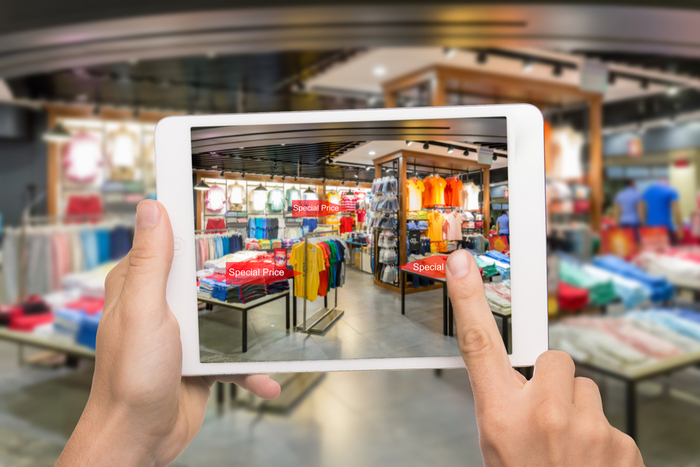The term “concept store” has been thrown around a lot this year, and it’s not hard to see why.
It’s no longer associated with showrooms or flagships because stores everywhere – namely well-established retailers – are launching them to exhibit their offerings in a unique way. According to research and development firm Unibox, a concept store “takes the point of view of a magazine, changes like a gallery, and sells things like a store”.
A killer window display may have once enough to lure shoppers in store. Retailers often depended on occasions such as Valentine’s Day and Mother’s Day to exhibit their flamboyant displays. But these days, and increasing number of retailers are opting for an in-store offering that persuades visitors to spend more time shopping with them.
However, this raises the question as to whether concept stores are enough to drive sales, and whether retailers should instead be focusing on customer feedback and engaging with their own colleagues to build on a successful foundation within the business.

Just recently, stablemates John Lewis and Waitrose launched a customer experience-centric concept at the former’s Southampton branch in south east England. The new concept, which opened to the public on November 19, is part of a trial that could be rolled out nationally if successful.
Highlights of the new concept include stay-and-play gadget areas, a new farm shop and roof garden from the John Lewis Partnership’s Leckford Estate, the first ever Waitrose Cookery School inside a John Lewis store, beauty and fashion gift experiences including a personal styling package, and specialist gardening talks and home consultations about garden redesign.
John Lewis’ efforts is just another example of how customer experience has become the focus of in-store point of sale. They’re also the latest is a growing list of retailers that are adapting their spaces as “concept stores” in order to align with the changing expectations of shoppers.
“As consumers begin to expect more from their in-store experience, retail brands must provide personalisation, better interactions and an exciting and engaging shopping experience – something that the introduction of concept stores is helping to deliver,” said Stuart Geekie, managing director of engineering and manufacturing group HMY.
Laura Morroll, senior manager at tech consulting firm BearingPoint, said concept stores were all about a “window to the brand’”.
“They provide an excellent means of bringing to life the lifestyle image that is so important to consumers. They don’t buy products after all, they buy into lifestyles and visions,” she told Retail Gazette.
Another major feature of the surge in concept stores this year is the incorporation of the latest technology to present products.
“Technology plays an important part in concept stores – they’re often seen as a way to showcase the power of the brand,” Morroll said.
“Whether it is augmented reality fitting rooms, floor to ceiling LED screens, or digital points of sale, cutting edge technology makes a great statement.”

Adidas’ new four-storey 27,000sq ft flagship on London’s Oxford Street is an example of a concept store that capitalises on technology to enhance customer experience. Described by the sportswear giant as its “most digital store to date”, Adidas introduced features such as interactive changing room mirrors and a printing machine for customising products in store.
“For fashion retailers, virtual mirrors and holographic displays work very well and will offer a point of difference to competitors – resulting in customers walking away, eager to tell their friends and return at a later date,” Geekie told Retail Gazette.
However, one challenge that retailers face when it comes to concept stores is that they can be costly – which also means retailers may find it difficult to roll them out across its bricks-and-mortar estate.
Moreover, with the UK’s already expensive rent rates, retailers face a dilemma as costly concept stores could still fail to drive sales, and they’re left with the added rent bill.
Daniel Todaro, managing director at marketing consultancy Gekko, argued that due to the “meticulous detail that goes into a concept store”, the detail is often diluted when the concept stores are replicated and rolled out nationally to an entire estate – normally due to cost or installation.
Morroll agreed, adding that concept stores represent a “huge investment” for retailers and often “years of planning so it’s important to get it right as mistakes in location or appearance will impact on the profit line in a significant way”.
Todaro also highlighted how concept stores tend to only be in high-footfall areas and/or high-profile central city locations.
“If you look at London, there’s Samsung, Apple, Microsoft, Nike, Boots that all have concept stores in prime retail locations,” he said.
“This means that the customer experience in a concept store is potentially very different to the experience elsewhere making it very difficult for brands to maintain consistency of experience, customer journey, range and services.”
Retailers may be dolled up to engage visitors, but captivating shoppers’ attention and meeting their demands may be more of a challenge than anticipated, according to Chris Donnelly, chief executive of digital agency Verb Brands.
“Their lack of loyalty and expectation of immediacy on delivery and unparalleled customer service is making retail operations one of the biggest headaches for brands to solve,” he told Retail Gazette.
“It’s no longer just about product, but the experience that the overall brand can offer.
“What are their brand values? What do they stand for? Who do they align themselves with?”
Todaro agreed: “Whilst we are going through a period of change in physical retail, it is important that brands live in the ‘real world’ in an enticing and engaging way that speaks to its target audience.”
One retailer that built its concept store around a relevant matter is The Body Shop. In September, it revamped its London Bond Street store into a concept store by offering a dedicated activism corner, refill station and product zones where customers can learn more about the retailer’s sustainability initiatives.

The Body Shop managing director Linda Campbell told Retail Gazette that although the UK retail industry has faced huge and extensively-reported challenges in recent years, there remained “a crucial role” for bricks-and-mortar stores.
“We’ve put our customer much more at the heart of the experience; there’s room for testing and playing with products, finding out more about where the ingredients come from and how they’re made – it’s much more of an experience,” she said.
“We believe that we’ve been well placed as a business to capture growing demand for natural and clean beauty, while tapping into our activism roots and making this an integral part of how the store can tell our story as an ethical business, putting our environment and community initiatives at the fore.”
Since concept stores are about discovery and experience, the products, design and even in-store events have to constantly change in order to keep up the evolution of retail. Experiential elements such as a café, in-store talks and screenings help build a community around the lifestyle or brand they embody. The aim for these retailers is to create a space where consumers want to hang out, meet friends and sit and work in.
Concept stores should focus on the rate of interaction rather than simply strengthen a retailer’s brand via a standard flagship. It’s this reason that retailers use concept stores as to test the waters before rolling out ideas on the high streets around the country.
However, while customer experience is everything – it’s arguable that retailers run the risk of focusing too much on display and less on the quality of delivery.
Click here to sign up to Retail Gazette’s free daily email newsletter


















